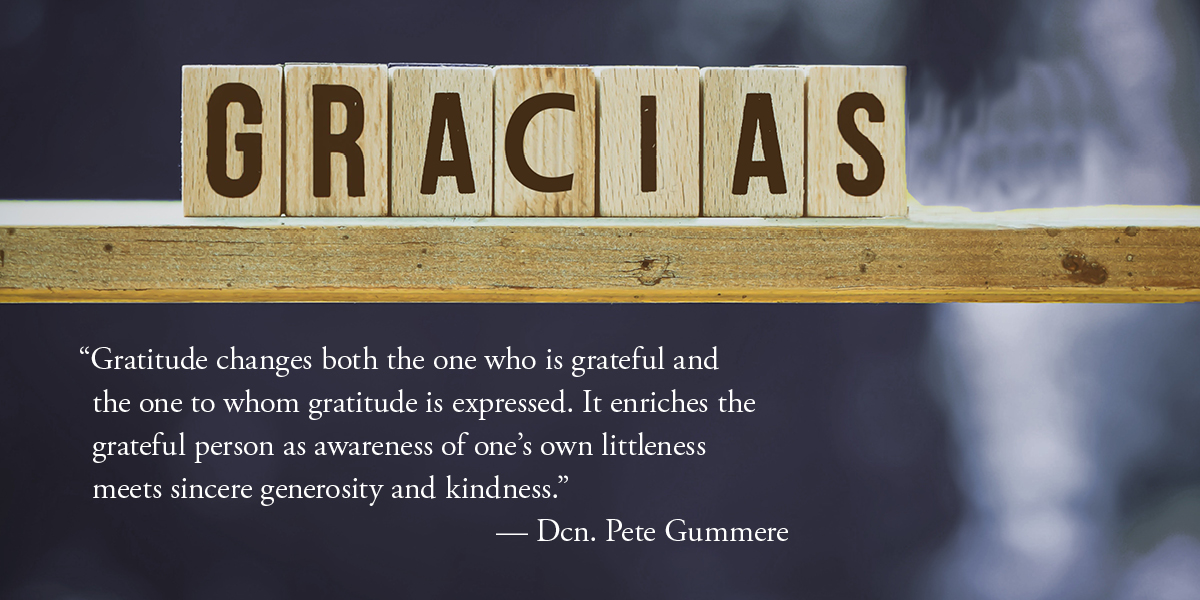
Leading with gratitude
Years ago, I hurried while entering one of those large buildings in New York City. The person ahead of me held the door as I entered. I was focused on one business issue or another, and that simple courteous act simply did not register. Then, that gracious individual exclaimed in one breath, “Thank you!” then “Oh! You’re welcome.”
By the time I realized my faux pas and my serious lapse of good manners, we were both lost in the crowd. Absolutely embarrassing! Yet I got an essential reminder that day to always recognize even small acts of courtesy extended by others and to be grateful to the person doing that act.
Gratitude changes both the one who is grateful and the one to whom gratitude is expressed. It enriches the grateful person as awareness of one’s own littleness meets sincere generosity and kindness.
But gratitude also enriches the other party; the other person becomes aware of how their own action can have a positive impact on another.
The dynamic is akin to the “quality of mercy” expressed by Portia in Shakespeare’s “The Merchant of Venice” — “It blesseth him that gives and him that takes. …” Likewise, gratitude blesses both parties.
By actively cultivating and expressing a deep sense of gratitude, we can make a genuine difference in our society, albeit a small difference. Small differences can add up.
Modern culture is nearly bereft of civility and good manners. So often, people are vilified for having an opinion not congruent with those of another person. That can be a political opinion or a religious conviction. In some countries those with non-conforming opinions, politics or religions are horrifically persecuted, even to death.
The starting point for gratitude needs to be deep, genuine gratitude to God and is poignantly expressed in our reception of the Holy Eucharist. The word “eucharist” is derived for the Greek word for thanksgiving. In receiving the Eucharist, we give thanks to God, the Father, for the gift of His Son and the suffering Jesus endured for us. Not only do we receive the body, the real presence, of Jesus in the Eucharist, but we benefit. We grow more Christ-like.
That mere gesture of gratitude to God enriches us beyond imagination. The God of all creation shares His very being, His very self with us. He gives Himself completely. Receiving the Eucharist does change us. Gratitude to God for that precious gift is essential. In those moments reflecting on His complete generosity, we become more deeply aware of His gift to us.
In turn, God appreciates your gratitude and blesses it.
A prayer of thanks should be offered silently after receiving the Eucharist such as Anima Christi. But there are others. Or a prayer of thanks in your own words is a beautiful gesture of gratitude.
Recall that the Eucharist is the source and summit of our lives as Christians. At Mass, the priest prays that those who partake in the Eucharist “…may become one body, one spirit in Christ.” Hence, we can bring the peace and the love of Christ and the service of Christ to others. We are transformed by the Eucharist.
Having worthily received the Eucharist and having given thanks for that gift, it is now time to share the gift of our faith with others. But how? No doubt that sharing will involve both actions and words.
To be clear, we do not have to go out preaching on Main Street. Nor do we have to go from door to door inviting people to attend Mass. Instead, let’s be open to people, adjusting our conversation and actions to fit a situation before us. Perhaps lead with a simple “thank you” for a kind gesture such as someone holding the door open for you. Gratitude is but one way to reach people; it is a simple and direct way to connect with a total stranger.
Moving beyond gratitude, think of other elements of simple human interaction and its effect of building relationships with others: Joy, love, peace, patience, gentleness, kindness, goodness, faithfulness and self-control. These are Christ-like attitudes; they happen to be Fruits of the Holy Spirit.
Those attitudes, those virtues touch people’s hearts. The people touched by those virtues in you become more open to the reality of the life we share in Christ.
It is amazing what God can accomplish through a gracious “thank you,” a kind word or a joyful face. We never know what positive impact we have on others.
—Deacon Pete Gummere serves at Corpus Christi Parish in St. Johnsbury and as the Diaconate Director for the Diocese of Burlington. He is also a bioethicist.
—Originally published in the Spring 2023 issue of Vermont Catholic magazine.

